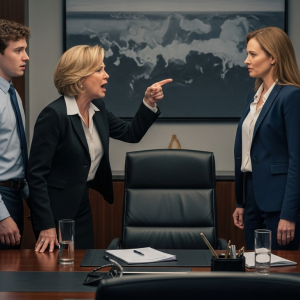The Sterling mansion was less a home and more a museum of Margaret Sterling’s ego. Every portrait, every polished antique, every shard of Waterford crystal was a testament to the dynasty she had married into and now, since her husband George’s passing, ruled as its undisputed queen.
Her daughter-in-law, Elara, was a notable exception to the curated perfection. In Margaret’s eyes, Elara was a smudge on the family’s otherwise impeccable canvas—too quiet, too plain, and utterly lacking in ambition.
“Still playing with your little hobby, dear?” Margaret asked, her voice dripping with condescension. She glided into Elara’s home office, a space she considered a frivolous waste of a perfectly good guest suite. Elara was on a video call, her face a mask of concentration.
“It’s work, Margaret,” Elara replied, her tone even as she ended the call. “I’m a freelance legal consultant.”
“Of course, you are,” Margaret said with a dismissive wave of her hand. She peered at the screen. “It looks remarkably like gossiping with your friends.” To Margaret, any work that didn’t involve a corner office in the Sterling Tower was merely a game of make-believe.
This condescension had been the ambient noise of Elara’s marriage. But since George’s death six months ago, it had sharpened into a weapon. The reading of the will had been a declaration of war. George, the shrewd tycoon, had left the bulk of his controlling shares in Sterling Industries not to his wife or son, but to a mysterious, iron-clad entity called the “Sterling Family Trust.”
The true insult was the trust’s governing clause: control would be ceded to the “family member who has demonstrated superior legal and business acumen.” Margaret was incandescent with rage, certain it was a ploy by George’s old business partners to wrest control.
“I’ll break it,” she had vowed to her son, Liam, Elara’s husband. “I’ve found the most ruthless inheritance lawyers in the city. A firm called North Star Advisory. They’re sharks. They will tear this ridiculous trust apart.”
Liam, who knew his wife’s quietness concealed a formidable intellect, had made a timid suggestion. “Perhaps you should ask Elara to look at the paperwork, Mother. She’s brilliant with contracts.”
Margaret had let out a shrill laugh that echoed in the grand foyer. “Elara? Don’t be absurd, Liam. I need a killer, not a kitten who plays lawyer on her computer. This is the real world.”
Elara, who had overheard from the next room, did not react. She simply stored the insult away, another piece of kindling for a fire she was patiently building. She remembered George’s words to her, spoken in this very house not long before he passed. He had looked at her with his sharp, appraising eyes.
“You are the future of this family, Elara,” he’d said, a deep sadness in his voice. “Whether she sees it or not. Don’t let her vanity burn down the empire I built. Promise me.” Elara had promised. And Elara always kept her promises.
For the next six months, Margaret’s war against the trust became her singular obsession. She funneled a small fortune into North Star Advisory, reveling in their reputation for aggressive, merciless tactics. She held bi-weekly strategy sessions with their lead attorney, a sharp, impeccably dressed man named Ben Carter.
“We are making excellent progress, Mrs. Sterling,” Ben would report, his demeanor a perfect blend of deference and confidence. “We’ve analyzed the trust from every angle. It’s a fortress. George Sterling built it to last.”
“But there is a weakness?” Margaret would press, her eyes gleaming.
“Not a weakness. A keyhole,” Ben would correct her. “The ‘Acumen Clause.’ Our entire strategy now hinges on proving that your son, Liam, is the only family member who meets the criteria. We are building an exhaustive portfolio of his business achievements.”
Margaret would preen, delighted. It was all going according to her plan. She was paying for the best, and they were delivering. She imagined the triumphant day when Liam would take his rightful place, with her, naturally, as the guiding hand behind the throne.
Meanwhile, at the Sterling mansion, Elara continued to “play” at her job. Margaret would often sweep past her office and see her on what appeared to be endless video calls. She’d see Elara poring over dense documents, her brow furrowed in concentration.
“Still gossiping, dear?” Margaret would taunt.
“Just a difficult case, Margaret,” Elara would reply, never looking up.

Those difficult cases were, in fact, the very strategy sessions Margaret was paying a fortune for. On the other side of Elara’s screen, Ben Carter and a team of a dozen lawyers would be mapping out the next phase of the Sterling Trust litigation. Elara was not just a consultant; she was the architect.
Her husband, Liam, remained her unwitting, but loyal, supporter. “I don’t know why Mother is paying North Star so much,” he said one evening. “The strategy they’re proposing—highlighting my work on the Singapore expansion—was your idea. I mentioned it to them, and they acted like it was genius.”
Elara simply smiled. “A good idea is a good idea, no matter who says it.” She was an artist of omission, a master of letting others take credit while she quietly moved the pieces on the board into their final, inescapable positions.
Margaret, blinded by her own arrogance, never once made the connection. She bragged at her country club about the brilliance of her legal team, about the “sharks” she had hired. She had no idea that the shark tank’s owner was living under her own roof, silently observing, waiting for the perfect moment to strike.
The final strategy meeting was held in the soaring, minimalist boardroom of North Star Advisory. Floor-to-ceiling windows offered a panoramic view of the city—a view of the kingdom Margaret was about to reclaim. She sat at the head of the gleaming obsidian table, a queen holding court, radiating smug satisfaction.
Ben Carter stood before a large presentation screen, his demeanor as polished as the marble floors. “Mrs. Sterling, we are ready. We have filed the final motion. We have successfully argued that the court must appoint a director for the Trust based on the ‘Acumen Clause.’”
He clicked a remote, and a summary appeared on the screen. “The motion petitions the court to recognize Liam Sterling as the sole qualifying family member, based on his documented executive experience.”
Margaret smiled, a slow, triumphant curl of her lips. It was over. She had won. She had beaten her dead husband’s foolish, sentimental will and secured her family’s legacy. She was already composing the speech she would give at the next shareholder meeting.
Just as she was about to raise a glass of sparkling water in a silent toast to herself, the frosted glass doors at the end of the boardroom slid open with a quiet hiss.
Elara entered.
But this was not the Elara that Margaret knew. Gone were the simple clothes and the quiet, accommodating posture. This Elara wore a bespoke navy-blue power suit that was tailored to perfection. Her hair was pulled back in a severe, elegant style. She moved with an icy confidence, her heels clicking with sharp authority on the floor. She did not look like a daughter-in-law; she looked like a CEO.
Margaret’s triumphant smile faltered, replaced by a confused frown. “Elara? What are you doing here? This is a private meeting.”
Elara didn’t even glance at her. Her gaze was fixed on her employee. “Thank you for the summary, Ben,” she said, her voice crisp and commanding. “Now, please bring up file 7A—the North Star Advisory incorporation documents. Cross-reference them with the private investment portfolio of Mr. George Sterling, dated three years ago.”
Ben, without missing a beat, clicked the remote. The screen changed. A new set of documents appeared. Margaret squinted, her confusion morphing into a dawning, sickening dread.
There, under “Founding Investors” for North Star Advisory, was a single name: George Sterling. The sole financier.
Another click. A notarized and legally binding addendum to the Sterling Family Trust appeared. It was a formal appointment. It named Elara Sterling as the designated Executive Director of the Trust, citing her as having fulfilled the Acumen Clause based upon her…
“…proven and exemplary success in founding, building, and operating a top-tier law firm specializing in asset and inheritance management.”
At the bottom of the page was George’s signature, bold and unmistakable. A ghost, reaching out from the grave to anoint his true successor.
The air in the room became thick and unbreathable. Margaret’s face had gone ashen. She looked from the screen to Elara, her mind struggling to connect the impossible dots.
Only then did Elara finally turn and look at her mother-in-law. Her expression was not triumphant, or angry, or even satisfied. It was utterly, terrifyingly neutral.
“You called me a freeloader, Margaret,” Elara said, her voice calm and level. “And you were right. For the past six months, I have been freeloading on your legal fees to fund the meticulous preparation for my own corporate takeover.”
She took a small step forward, her presence dominating the room. “So, thank you. Thank you for funding your own defeat. The invoice for today’s meeting will be in the mail.”
The destruction of Margaret Sterling was not a loud, fiery explosion, but a quiet, complete implosion.
Financially, the blow was staggering. She had spent millions of her personal fortune paying her own daughter-in-law to strategically disarm and dismantle her. But the true humiliation was the new reality. She had lost control of the Sterling empire. Now, every expense, from the upkeep of the mansion to her personal allowance, was subject to the approval of the trust’s new director. The “freeloader” was now the one who signed her checks.
Socially, she was ruined. The story became the stuff of legend in their elite circles, a whispered tale of epic hubris and breathtaking revenge. Margaret, the proud matriarch, was now seen as a fool, a woman so blinded by prejudice that she had been outmaneuvered in the most spectacular way imaginable. The invitations to galas and charity boards dwindled, then stopped completely. She was no longer a player; she was a cautionary tale.
But the deepest wound was psychological. Margaret’s entire identity was built on being the powerful mistress of the Sterling family. That identity had been stripped from her, not by an outside force, but by her own hand, guided by the quiet genius she had refused to see.
She was now a tenant in her own home, a ghost at her own table. She would watch Elara leave for the Sterling Tower in the morning, dressed in the armor of corporate power that Margaret once believed was her own. She would see Liam, her own son, looking at his wife with a newfound awe and respect that he had never shown her.
Margaret was left with nothing but her vast, empty mansion and the crushing knowledge that she had been the architect of her own irrelevance. Every day, she had to face the “useless” daughter-in-law she had despised, and see in her the reflection of a brilliant strategist who now held the fate of the entire Sterling dynasty in the palm of her hand. The queen was deposed. The freeloader now sat on the throne.
The victory was not a finish line; it was the firing of a starter pistol for a different kind of race. Elara’s first act as Director of the Sterling Family Trust was to move into George’s old office on the top floor of the Sterling Tower. It was a space Margaret had always refused to touch, preserving it as a shrine to her late husband.
Elara had it completely renovated. She stripped away the heavy mahogany and dark leather, replacing it with steel, glass, and clean, minimalist lines. It was no longer a museum of the past; it was a command center for the future. It was her space now, and it reflected her mind: pragmatic, clear, and utterly unsentimental.
Two weeks into her new reign, she received her first visitor. Margaret did not ask for an appointment. She simply appeared, a storm cloud of Chanel and indignation, sweeping past Elara’s new executive assistant as if she were merely a piece of furniture.
“This office. What have you done?” Margaret began, her voice trembling with rage. “You’ve erased him. It’s sacrilege.”
Elara looked up from a quarterly earnings report, her expression unreadable. “George wasn’t a sentimentalist, Margaret. He valued progress. This office is now a place of work, not a memorial.”
Margaret’s jaw tightened. She hadn’t come to argue about decor. She placed a velvet-bound proposal on the glass desk. “The annual Sterling Charity Gala. As you know, I am the chairwoman. The planning committee requires the first tranche of funding released from the family accounts.”
It was a test. The Gala was Margaret’s crown jewel, the pinnacle of her social calendar. It was an event built entirely on her influence and the Sterling name.
Elara did not open the proposal. She simply slid it back across the desk. “The Trust has a fiduciary duty to its shareholders. Its purpose is to ensure the growth and stability of Sterling Industries, not to fund social events.”
“It is a Sterling tradition!” Margaret hissed. “It is vital for our family’s reputation!”
“A reputation for what?” Elara asked, her voice dangerously quiet. “Extravagance? Or excellence? I will approve all of your regular living expenses, Margaret. Your household staff, your cars, your personal needs will be met without question. But the Trust’s capital is not a party fund.”
She finally opened the folder, scanned the exorbitant budget, and closed it. “I will, however, approve a donation to the hospital the Gala supports, for the exact amount of their pediatric wing’s budget shortfall. We will support the cause, not the party. There will be no gala this year.”
It was a masterful, devastating move. Elara had fulfilled the charitable obligation while simultaneously stripping Margaret of the social power and public glory she craved. Margaret stared at her, speechless. She was seeing the full, terrifying scope of her defeat. She had no power here. She was a beneficiary, a dependent. A freeloader.
Elara’s next challenge came not from a vanquished matriarch, but from the old guard. The board of Sterling Industries was populated by men who had been loyal to George, and by extension, to Margaret’s traditionalist view of the company. They saw Elara as a usurper, a clever lawyer who had won through a loophole.
At her first official board meeting, she proposed a radical new strategy: sell off the company’s legacy print media division. It was a sentimental favorite of George’s, but it had been losing money for a decade, a drain on their more profitable tech and logistics ventures.
Arthur Vance, a board member for thirty years and a close friend of the family, led the opposition. “With all due respect, Ms. Sterling,” he began, his tone oozing condescension, “you are new to this world. That division was the foundation of this company. It is our history. It is the Sterling identity.”
“Its identity is a balance sheet drenched in red ink, Arthur,” Elara countered, her voice cutting through the stuffy boardroom air. A detailed projection flashed onto the screen behind her, showing the division’s financial trajectory. It was a nosedive in graphical form.
“Respect for the past cannot be an excuse for bankrupting the future,” she continued, her gaze sweeping across the table, meeting the eyes of every skeptical director. “George Sterling was not a historian; he was a visionary. And a visionary knows when to let go of a sinking ship to build a fleet of faster ones.”
She laid out her plan with cold, irrefutable logic. The capital from the sale would be reinvested into their burgeoning AI logistics subsidiary, a sector poised for exponential growth. She presented data, market analysis, and a five-year growth projection that was audacious yet meticulously researched. She wasn’t asking for their permission based on her name; she was commanding their assent based on her competence.
One by one, the faces of the old guard shifted from skepticism to grudging respect. They were businessmen, and they recognized a brilliant, profitable plan when they saw one. The vote was unanimous. Elara had not just won the meeting; she had established her rule.
That night, she came home late. The mansion was quiet. Liam was waiting for her in the library, a glass of wine poured for her. He had heard about the board meeting. The news was already spreading.
“They’re calling you ‘The Surgeon,’” he said with a small, weary smile. “Cutting out the sentimental parts to save the patient.”
Elara sank into the chair opposite him, the exhaustion of the day finally settling upon her. “It was necessary.”
Liam looked at her, his expression a mixture of awe and a deep, lingering sadness. “I know it was. I look at you, and I see the woman my father always knew you were. But Elara… my mother. She is completely broken. Was there no other way? Did it have to be so… absolute?”
It was the question that had hung between them since the day of the takeover. Elara met his gaze, and for the first time, she allowed a flicker of the immense strain she had been under to show.
“He asked me to protect his legacy, Liam,” she said softly. “And it needed protecting. Your mother… she was in talks with a competitor to sell off the logistics subsidiary. She called it ‘unglamorous.’ She wanted to use the capital to buy a European fashion house. She would have sold the future for a vanity project. She would have bled the company dry within five years.”
The truth landed in the quiet room, rearranging all of Liam’s remaining sympathy for his mother. He finally understood. This hadn’t been a simple power grab. It wasn’t just revenge. It was a rescue mission.
He reached across the space between them and took her hand. “My father chose well,” he said, his voice thick with emotion. “He always did.” In that moment, the final piece of Elara’s new world clicked into place. She had the company, she had the power, and she had the unwavering loyalty of the man beside her. The crown was heavy, but she was finally strong enough to wear it.




